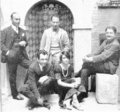Alexander Woollcott

Alexander Humphreys Woollcott (born January 19, 1887 in Phalanx at Red Bank , New Jersey , † January 23, 1943 in New York City , New York ) was an American writer , journalist and literary critic .
Life
Alexander Woollcott grew up in poor conditions. With the support of family friend Dr. Alexander Humphreys (after whom he was named) studied at Hamilton College in Clinton , New York, and graduated with a bachelor's degree in English literature . Until the outbreak of World War I , he worked as a journalist for The New York Times . In 1916 he volunteered for the army and came to France with the US Army Eighteenth Engineers Railway Regiment .
In Paris , Woollcott worked for the Stars and Stripes , an eight-page troop newspaper. Within a very short time he made the acquaintance of journalists Harold Ross , Cyrus Baldridge , Franklin Pierce Adams and Jane Grant .
Back in New York in the 1920s, he was a frequent guest in the literary circle at the Algonquin Hotel , called the Algonquin Round Table , a loose group of journalists , writers and actors . The core of the artists of his time there einkehrten include Dorothy Parker , Robert Benchley , Robert E. Sherwood , Heywood Broun , Marc Connelly , Alice Duer Miller , Harpo Marx , Jascha Heifetz , Janet Flanner , Solita Solano , Ruth Hale , George S. Kaufman , Harold Ross , Neysa McMein , Franklin Pierce Adams , Edna Ferber , Irving Berlin and Bernard Baruch .
At the same time Woollcott got his own column ( Shouts & Murmurs ) in the weekly newspaper The New York Times , in which he reported on the social and cultural life in the city. Through his friendship with the British journalist Walter Duranty and the Soviet Foreign Minister Maxim Maximowitsch Litvinow , Woollcott traveled to the Soviet Union in the 1930s. In his radio broadcasts Woollcott commented on the path of the Soviet Union in a Stalin-friendly way, whereby he did not deny the brutality of the regime , but explained and justified it from the historical and economic realities of Russia . During a radio broadcast, Alexander Woollcott suffered a stroke - from the consequences of which he died.
Worth mentioning
- In the 1920s Woollcott promoted the career of the Marx Brothers , who became known through films as well as television and theater appearances with musical interludes and significantly inspired subsequent comedians.
- In 1935 he had a guest appearance in the drama A Charming Scoundrel ( The Scoundrel ).
- In 1941 he was seen in the opening sequence of the musical film Babes on Broadway .
- Woollcoot served as the model for the character of villainous theater critic Waldo Lydecker , played by actor Clifton Webb , in the film Laura (1944). He was also the model for the character of the self-centered and cynical, but ultimately lovable radio star Sheridan Whiteside in the play and film The Man Who Came to Dinner .
- In 1939 he appeared in the documentary Five Times Five for which he had also written the script.
gallery
literature
- Morris U. Burns: The Dramatic Criticism of Alexander Woollcott , Scarecrow Press (1980) ISBN 0-8108-1299-1
- Edwin P Hoyt: Alexander Woollcott: The Man Who Came to Dinner , Abelard-Schuman (1969) ISBN 0-200-71504-6
- Beatrice Kaufman and Joseph Hennessey: The Letters of Alexander Woollcott , The Viking Press, New York (1944)
Individual evidence
- ↑ The Man Who Came To Dinner. Retrieved November 12, 2017 .
| personal data | |
|---|---|
| SURNAME | Woollcott, Alexander |
| ALTERNATIVE NAMES | Woollcott, Alexander Humphreys |
| BRIEF DESCRIPTION | American writer and literary critic |
| DATE OF BIRTH | January 19, 1887 |
| PLACE OF BIRTH | Phalanx at Red Bank , New Jersey |
| DATE OF DEATH | January 23, 1943 |
| Place of death | New York City , New York |


